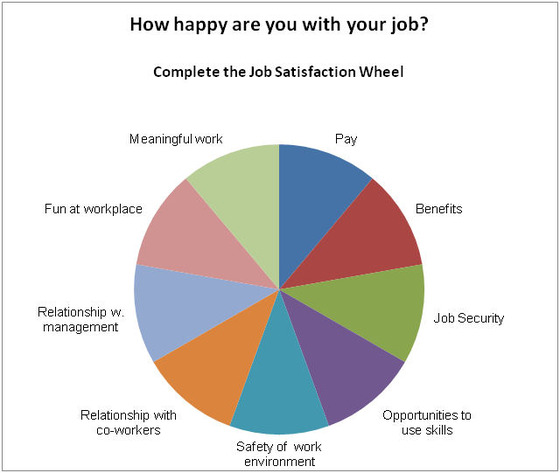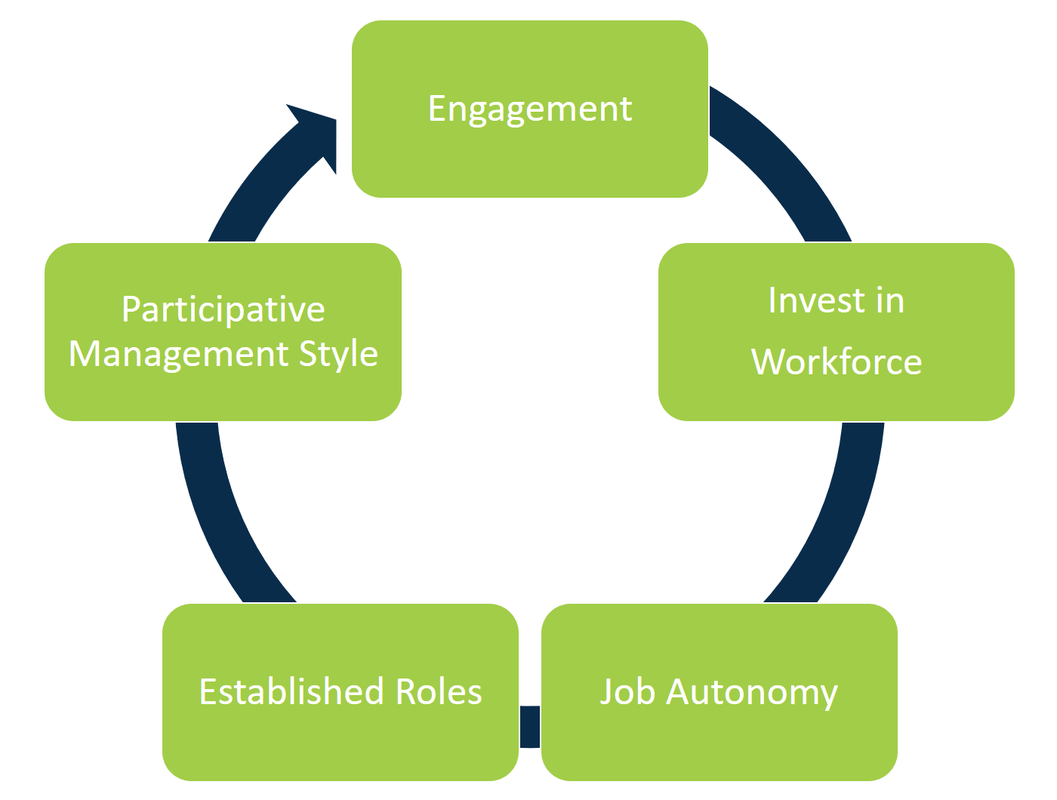How To Increase Job Satisfaction In The Workplace
To increase job satisfaction in the workplace, focus on employee engagement and recognition. Create a positive work culture that emphasizes open communication, provides opportunities for growth, and rewards achievements.
This will lead to higher job satisfaction, productivity, and employee retention. Job satisfaction is vital for organizations as it contributes to higher job performance and overall success. When employees feel valued and appreciated, they are more likely to be motivated, satisfied, and committed to their work.
We will explore effective strategies and practices that companies can implement to enhance job satisfaction in their workplace.
:max_bytes(150000):strip_icc()/169416424-F-56a4f1233df78cf772856f97.jpg)
Credit: www.liveabout.com
Creating A Positive Work Environment
Increase job satisfaction in the workplace by creating a positive work environment. Foster strong team relationships, provide opportunities for growth and recognition, and promote work-life balance to boost employee morale and productivity. Transform your workplace into a thriving and harmonious space where employees feel valued and motivated.
Creating a Positive Work Environment Promoting a Culture of Open Communication Encouraging Collaboration and Teamwork Building a positive work environment is vital for increasing job satisfaction in the workplace. A positive work environment fosters employee engagement, productivity, and overall job fulfillment. One way to create such an environment is by promoting a culture of open communication. Promoting a Culture of Open Communication Open communication plays a pivotal role in creating a positive work environment. When employees feel comfortable expressing their thoughts, suggestions, and concerns, it fosters trust, transparency, and camaraderie among team members. In this kind of environment, every employee knows that their voice is heard and valued. Encouraging collaboration and teamwork Collaboration and teamwork are essential for a positive work environment. When employees work together towards a common goal, it enhances productivity, creativity, and problem-solving skills. Encouraging collaboration can be done by implementing group projects, cross-functional teams, and brainstorming sessions where employees from different backgrounds can contribute their unique perspectives. In addition, ensuring that employees have the necessary resources and support to collaborate effectively is crucial. This can be achieved by providing the right tools, such as project management software, communication platforms, and designated collaboration spaces. Moreover, recognizing and rewarding collaborative efforts can further reinforce a culture of teamwork. By creating a positive work environment that promotes open communication and encourages collaboration and teamwork, employers can greatly enhance job satisfaction in the workplace. Employees will feel valued, engaged, and motivated to contribute their best, ultimately leading to a more productive and fulfilling work environment.Offering Opportunities For Growth And Development
This description highlights the importance of offering opportunities for growth and development in the workplace, resulting in increased job satisfaction. By providing avenues for professional advancement and skill enhancement, employees are more likely to feel fulfilled and engaged in their work.
Providing Training And Workshops
To foster job satisfaction in the workplace, offering opportunities for growth and development is crucial. One effective way to do so is by providing training and workshops to employees. These learning sessions not only sharpen their skills but also boost their confidence and motivation. By offering training programs catered to different job roles, you can empower your employees to enhance their expertise, which ultimately leads to improved job satisfaction.Training programs offer a structured learning environment, allowing employees to gain new knowledge and acquire additional skills that are relevant to their roles. Whether it’s technical skills like software proficiency or interpersonal skills such as leadership and effective communication, thorough training can positively impact employees’ job satisfaction.
Workshops, on the other hand, provide hands-on experiences that encourage employees to apply their knowledge and learn collaboratively. These sessions often involve interactive activities, discussions, and problem-solving exercises, which foster a sense of teamwork and engagement. Moreover, by bringing in external trainers or industry experts, you can provide fresh perspectives and insights, expanding employees’ horizons and igniting their passion for learning and professional growth.
Supporting Continuous Learning
Ensuring Each Heading Adheres To Html Syntax.
Besides providing training and workshops, supporting continuous learning is another key factor in increasing job satisfaction in the workplace. A culture that encourages and supports lifelong learning motivates employees to constantly improve and stay up-to-date in their field.One practical way to support continuous learning is by facilitating access to online courses, webinars, or educational materials. By investing in online learning platforms or subscriptions to reputable educational resources, you can provide employees with a wealth of knowledge at their fingertips. This flexible approach allows them to learn at their own pace and explore topics that interest them, aligning their personal development goals with the organization’s objectives.
Additionally, mentorship programs can serve as valuable tools for continuous learning. Pairing employees with experienced mentors not only helps them acquire new skills but also fosters a sense of belonging and support within the organization. Through regular one-on-one sessions, mentors can provide guidance, share insights, and offer constructive feedback, empowering their mentees to grow both personally and professionally.
Lastly, establishing a culture of continuous improvement is essential. Encourage employees to share knowledge and expertise with their colleagues through presentations, workshops, or internal podcast episodes. By celebrating and recognizing their efforts, you create an environment that emphasizes the value of growth, collaboration, and continual learning.
Recognizing And Rewarding Achievements
Increase job satisfaction in the workplace by recognizing and rewarding achievements. This creates a positive work environment and motivates employees to perform at their best, ultimately improving productivity and morale.
Implementing An Employee Recognition Program
Implementing an employee recognition program is an effective way to boost job satisfaction in the workplace. By acknowledging and appreciating the efforts and achievements of employees, it creates a positive and motivating work environment. This can be done through various means, such as:- Recognizing achievements publicly: Acknowledging employee accomplishments publicly during team meetings or through company-wide announcements reinforces the value placed on their hard work.
- Creating a rewards system: Implementing a rewards system based on performance allows employees to strive for success and feel recognized for their efforts.
- Providing personalized recognition: Tailoring recognition to individual preferences and strengths ensures that employees feel valued and appreciated on a personal level.
Providing Incentives And Benefits
Offering incentives and benefits to employees is another effective method to increase job satisfaction within the workplace. These could include:- Performance-based bonuses: Providing monetary rewards or bonuses based on performance goals achieved can motivate employees to exceed expectations.
- Career advancement opportunities: Offering opportunities for growth and advancement within the company demonstrates that their work is valued and contributes to their overall job satisfaction.
- Flexible work arrangements: Providing flexibility in work schedules or the option to work remotely can improve work-life balance, resulting in increased job satisfaction.
- Health and wellness benefits: Providing perks such as gym memberships, wellness programs, or access to healthcare services showcases a commitment to employees’ well-being and can lead to higher job satisfaction.

Credit: creativemarket.com
Fostering Work-life Balance
Creating a work environment that allows employees to maintain a healthy work-life balance is essential for increasing job satisfaction in the workplace. Fostering work-life balance not only enhances employee happiness and well-being but also boosts productivity and reduces burnout. There are several strategies that employers can implement to promote work-life balance among their workforce, including creating flexible work schedules and promoting wellness programs.
Creating Flexible Work Schedules
One effective way to foster work-life balance is by offering flexible work schedules. This approach allows employees to have control over their working hours, enabling them to attend to personal commitments without compromising their work responsibilities.
Benefits of flexible work schedules include:
- The ability to work during their most productive hours, which can positively impact performance and efficiency.
- Eliminating the stress of rushing to work during peak traffic hours, resulting in reduced tardiness and increased punctuality.
- Improved work-life integration, enabling employees to have more time for family, hobbies, and personal well-being.
By implementing a flexible work schedule policy, employers send a clear message to their employees that their personal lives are valued, leading to increased job satisfaction.
Promoting Wellness Programs
In addition to flexible work schedules, promoting wellness programs within the workplace is crucial for supporting work-life balance. These programs encompass various activities and initiatives designed to enhance employees’ physical and mental well-being.
Wellness program options may include:
| Activities | Benefits |
|---|---|
| Yoga and meditation classes | Reduced stress and increased mental clarity |
| On-site fitness facilities | Promotion of regular exercise and physical health |
| Wellness challenges and incentives | Encouragement for employees to prioritize their well-being |
By providing such wellness programs, employers demonstrate their commitment to the holistic well-being of their employees. These initiatives not only contribute to reducing work-related stress but also foster a positive and supportive work environment, resulting in increased job satisfaction.
Empowering Employees With Autonomy
Empowering employees with autonomy is crucial for increasing job satisfaction in the workplace. When employees feel trusted, valued, and given the freedom to make decisions, it not only boosts their confidence but also leads to higher levels of motivation and productivity. To achieve this, employers should focus on two key aspects: delegating authority and responsibility, and encouraging decision-making.
Delegating authority and responsibility is an effective way to empower employees and give them a sense of ownership over their work. By assigning tasks and projects that align with their skills and interests, employers can foster a sense of autonomy. It allows employees to take charge of their work, make decisions, and find innovative solutions to challenges. Furthermore, delegating authority and responsibility reduces micromanagement and enables employees to learn and grow professionally.
Encouraging decision-making is equally important in empowering employees with autonomy. Providing a supportive environment where employees feel comfortable making decisions without constant approval boosts their confidence. Employers can implement strategies such as creating clear decision-making guidelines or holding regular team discussions to encourage employees to share their ideas and perspectives. When employees are actively involved in the decision-making process, they feel valued and become more invested in the success of the organization.

Credit: www.hcamag.com
Frequently Asked Questions For How To Increase Job Satisfaction In The Workplace
How Can I Improve Job Satisfaction In The Workplace?
Improving job satisfaction in the workplace can be achieved by fostering a positive work culture and recognizing employee achievements.
What Are Some Effective Strategies To Boost Job Satisfaction?
Some effective strategies to boost job satisfaction include offering growth opportunities, promoting work-life balance, and fostering open communication channels.
How Important Is Job Satisfaction For Employee Retention?
Job satisfaction is crucial for employee retention as satisfied employees are more likely to stay with the company, resulting in reduced turnover rates and increased productivity.
Conclusion
Boosting job satisfaction in the workplace is crucial for both employees and employers. By implementing effective strategies such as fostering a positive work environment, promoting work-life balance, providing growth opportunities, recognizing achievements, and encouraging open communication, organizations can create a productive and satisfied workforce.
Remember, happy employees lead to better retention rates, increased productivity, and overall success for the company. So, invest in building a workplace culture that prioritizes job satisfaction and reap the rewards of a satisfied and motivated team.





